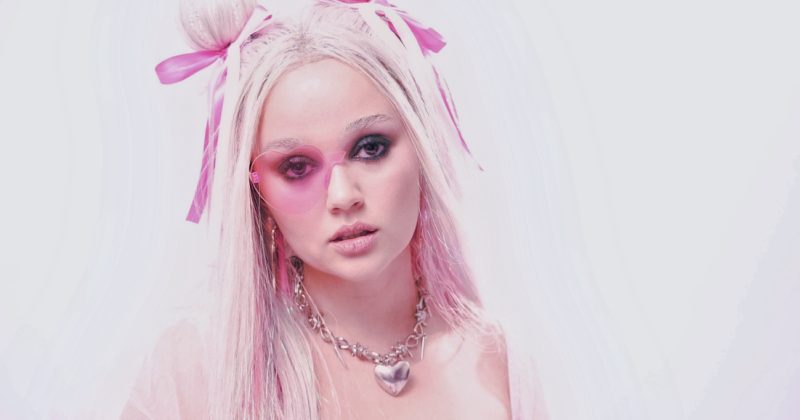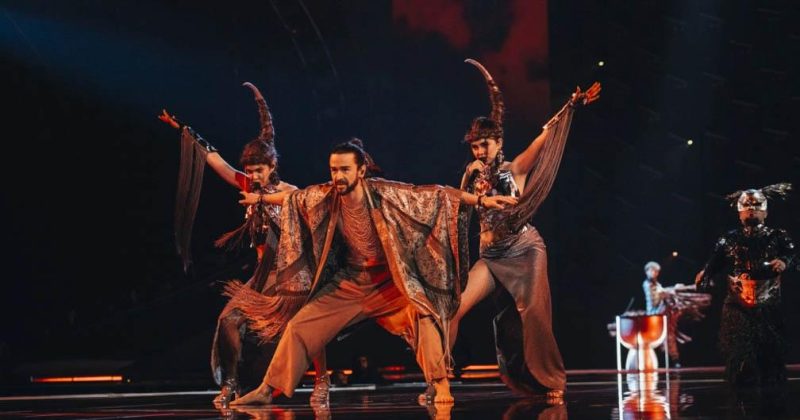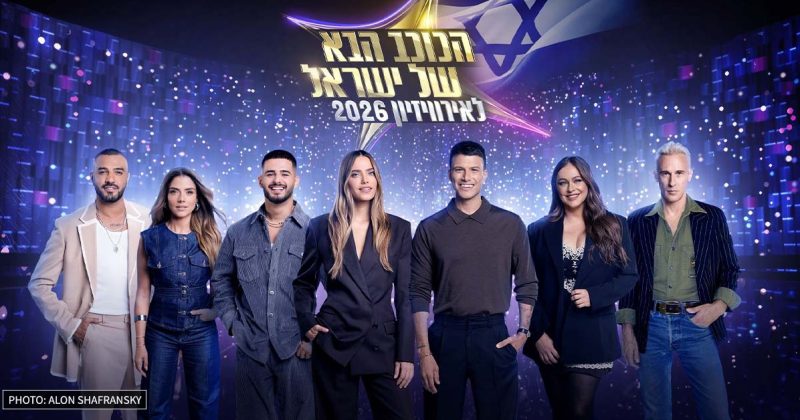
“HaKokhav HaBa” – Episode 3: Five contestants passed to the next round. The advancing contestants are Elior Shemesh, Ori Berko, Gal De Paz, Avi Assor, and Dorin Or.
Tonight, the third episode of the reality show “HaKokhav HaBa” aired, through which Israel’s representative for Eurovision 2026 will be chosen. This evening featured six auditions, with five contestants succeeding and moving on to the next stage thanks to the support of the judges and the studio audience. One of them might go on to represent Israel in Eurovision this coming May.
The panel once again included Assaf Amdursky, Keren Peles, Shiri Maimon, Eden Hasson, and Itay Levi. Each contestant must receive at least 70% of the votes to advance, and every judge contributes 12% to the total voting score.
Elior Shemesh
Elior Shemesh, 25, from Rosh HaAyin, is a musician, producer, and songwriter. She comes from a religious home and once hid from her father the fact that she sings and attends auditions. She met her husband, Avi Assor, while working as a singing waitress. Her husband is also competing against her in the show. For her audition, Elior chose the song “Where Have You Been” (originally by Rihanna). She took the song in a different direction from the original, showcasing a lovely, pop-style voice with both tenderness and strength. Her performance demonstrated vocal precision and emotional presence.
Eden told Elior:
“From the moment you opened your mouth, the way you stood, the way you looked into the camera – this whole visual image hypnotized me. You’re one of the best”.
Assaf voted no, saying:
“The performance wasn’t perfect. I didn’t feel anything authentic. Maybe it’s because of the song choice”.
For judges voted in her favor, Assaf voted against, but Elior received 82% and advanced to the next round.
Ori Berko
Ori Berko, 24, from Beit Aryeh, is a singer and flamenco guitarist. He recently returned from South America and has been serving frequently in reserve duty. Ori envisions himself on the Eurovision stage, driven by a desire to spread a positive message through music. For his audition, he chose the song “Akhrei Esrim Shana” (originally by Shmulik Kraus). The performance began with him sitting and playing the guitar. As he opened his voice, a warm and pleasant tone filled the room, creating the sense of a seasoned performer. He radiated confidence and charm throughout — an excellent audition.
Shiri said:
“You’re an incredible singer. You gave me that flamenco moment at the end! You’ve got more in you — that will be your special touch!”
Keren added:
“You’re over twenty when we have many contestants here aged 16 or 17, and we can hear your experience. You could represent us beautifully at Eurovision”.
All five judges voted in his favor. Ori received 90% and advanced to the next round.
Odeya Esther Ben Amram
Odeya Esther Ben Amram, 16, originally from She’ar Yishuv in northern Israel, and her family were evacuated from their home on October 8th, following the outbreak of the war. Odeya dreams of bringing pride to Israel by representing the country at Eurovision. For her audition, she chose to perform “I See Red” (originally by Everybody Loves an Outlaw). Despite her young age, Odeya displayed great confidence on stage and strong vocal ability, captivating the audience. However, the performance did not quite “take off”, as her voice is still raw, and she has yet to fully understand how to use her vocal tools effectively. She simply needs a bit more time to mature.
Shiri said:
“We missed her. You can’t just focus on the fact that she’s shouting — everything else, the attitude, the way she connects with the camera, her voice — I thought it was stunning. Vocally, there’s just something immature in the way you understand how to project your voice”.
Eden disagreed, saying:
“She has an amazing tone and incredible vocal abilities, but she needs a bit more time — that doesn’t mean anything negative about her”.
Assaf, Eden, and Itay voted no. Odeya received 46% and did not advance to the next round.
Gal De Paz
Gal De Paz, 38, from Tel Aviv, is an Israeli singer-songwriter. She took part in the first season of “Kokhav Nolad” in 2003 but was eliminated during the audition stage. In 2014, she founded the band The Paz Band and later joined the hip-hop collective Lucille Crew. She gained international recognition for her song “Bring Them Home”, a work inspired by the events of the war that became a global advocacy anthem. Over the years, she has explored diverse musical genres, from rock and indie to gospel and pop. For her audition, Gal performed “A Change Is Gonna Come” (originally by Sam Cooke). She sat at the piano and began singing in her uniquely textured voice. Her tone was unmistakable, her vocal precision remarkable. With perfect dynamic control, she demonstrated complete mastery of her instrument — a flawless performance.
Eden said:
“For me, the season just began. I think this is one of the best performances we’ve seen since the start of this season and even compared to past seasons. You’re a representative I could definitely trust”.
Keren, who knew Gal, added:
“I only have one question for you — are you ready to go to Austria? You’re the perfect representative for us. Your English is phenomenal, your confidence shines through, and you’re an incredible singer”.
All five judges voted in her favor. Gal received 91% and advanced to the next round.
Avi Assor
Avi Assor, 29, from Rosh HaAyin, is a singer, music producer, and the husband of Elior Shemesh, who performed earlier in the evening. For his audition, he chose to sing “Ad Machar” (originally by Evyatar Banai). Avi has a high, air-filled voice with a unique tone that he controls well, delivering the song’s lyrics with emotion and precision. Despite some hesitation among the judges, Avi was undoubtedly deserving of advancing past the audition.
Shiri said:
“It started off strange. You sang with too much air, and there wasn’t much dynamic range in the microphone. Then you opened up in the chorus and proved you’re a singer. It was like a roller coaster — up and down”.
Assaf commented:
“The song is beautiful, and you’re a beautiful singer, but the combination didn’t quite work. I couldn’t tell what you were singing about — whether you were angry or lamenting. Still, your vocal tone is lovely, and your improvisation was tasteful and musical. It’s impossible not to be impressed by your talent”.
All five judges voted in his favor. Avi received 79% and advanced to the next round.
Dorin Or
Dorin Or, 34, from Rishon LeZion, is married and a mother of a 3 year-old boy. She experienced the Tel Aviv party scene before beginning a journey of spiritual return to faith. Dorin is an Instagram personality known for combining spoken word with soulful music. For her audition, she chose to perform an original song she wrote about October 7th, titled “Mevarechet” (in English: “Blessing”). Dorin began the performance by reciting the lyrics with emotion and deep intention. The chorus, where she transitions into singing with gorgeous vocal ornamentation, was captivating. She alternated between spoken sections and the sung refrain, delivering an expressive, moving, and charismatic performance. Dorin has a truly unique style and brings her songs to life with passion and grace. While her art feels powerful and authentic, it’s not a style typically seen in Eurovision. Could Dorin succeed where others have not? Perhaps — it was an unexpectedly impressive audition.
Itay said:
“I think you’re incredibly special. It was simply beautiful, strong, powerful, and full of meaning. There’s something of Glykeria in your voice”.
Keren added:
“We’ve been living in deep denial for so long. It’s so necessary for a piece like this to exist right now — something we can listen to, release all the pain, and truly cleanse and start again. I think you’re an important creator for this generation”.
All five judges voted in her favor. Dorin received 83% and advanced to the next round.
“HaKokhav HaBa” for Eurovision
 Ahead of Eurovision 2026, the Israeli national broadcaster decided to continue its collaboration with Keshet 12 in selecting the next Israeli representative for the contest. This partnership between the broadcaster and Keshet has brought Israel seven consecutive qualifications to the Grand Final, highlighted by Netta Barzilai’s victory with the song “Toy”, which brought Eurovision to Israel.
Ahead of Eurovision 2026, the Israeli national broadcaster decided to continue its collaboration with Keshet 12 in selecting the next Israeli representative for the contest. This partnership between the broadcaster and Keshet has brought Israel seven consecutive qualifications to the Grand Final, highlighted by Netta Barzilai’s victory with the song “Toy”, which brought Eurovision to Israel.
We’ll be here throughout the entire season, reporting on all the latest news, updates, and predictions – stay tuned!
Follow us on Instagram | YouTube | TikTok | Twitter
Israel at Eurovision 2025
“New Day Will Rise” is the song performed by Yuval Raphael, who was chosen to represent Israel after winning the 11th season of “HaKokhav HaBa”. Israel advanced to the final after winning the second semi-final with 203 points and finished second overall with 357 points in the grand final. Israel ranked first in the public vote but only 14th with the jury. This marks the third consecutive year that Israel has reached the top five – an unprecedented achievement.
Eurovision 2026: This will be Israel’s 48th participation in Eurovision. Israel joined the contest in 1973 and has won four times. Its most recent victory was at Eurovision 2018 with the song “Toy”, performed by singer Netta Barzilai.

Email: [email protected]
Phone: +972-50-9441919
Ilay Gaist is a leading Israeli content creator and writer specializing in the Eurovision Song Contest. He is a well-known commentator with extensive expertise in the contest’s history, rules, and dynamics. His passion for Eurovision drives him to deliver rich, professional, and innovative content to his audience.
Ilay holds a bachelor’s degree in Arabic and has a multilingual background. He also engages in cultural research, with a particular focus on global culinary traditions and the evolution of local cuisines around the world.









